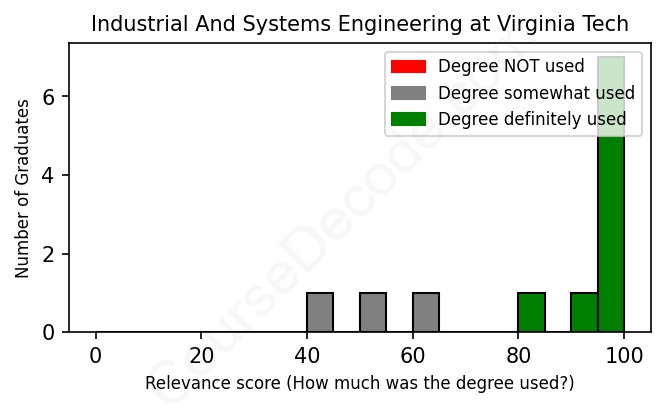
First, some facts. Of the Industrial And Systems Engineering graduates from Virginia Tech we've analyzed , here's how many have used (or NOT used) their degree in their career:

These are estimates based on AI analysis of 12 LinkedIn profiles (see below).
The verdict? Significantly above average. Overall, with an average relevance score of 85%, Industrial And Systems Engineering graduates from Virginia Tech have a much higher likelihood (+18%) of finding work in this field compared to the average graduate across all fields:
And for comparison, here's the chart for all profiles we've looked at across all degrees.
Also, after graduating, only 16% of these graduates have pursued further education other than another Bachelor's degree (such as a Masters degree or other), compared to the average across all profiles of 35%. This suggests a Bachelors degree is enough for most Industrial And Systems Engineering graduates, and it's normal to look for work straight after graduation.
See the details:
|
Relevance score: 50% We think this person has gone into a career only somewhat relevant to their degree. We think this person has gone into a career only somewhat relevant to their degree.
DEGREE INFOGraduated in 2023 from Virginia Tech with a Bachelor's degree in Industrial And Systems Engineering. No other secondary education since. JOB HISTORY SINCE GRADUATIONGPS Analyst Deloitte Jun 2023 - Present ABOUTNo information provided. |
The top 10 most common jobs done by the graduates we've analyzed (ranked most common to least) are:
Looking at the job profiles of graduates with a degree in Industrial and Systems Engineering from Virginia Tech, it seems like there’s quite a mix in the types of roles they’ve taken on. A good number of them have indeed landed positions that directly relate to their field, like Systems Engineer roles at companies such as Lockheed Martin, where they’re applying systems thinking and process optimization every day. Other roles like Business Systems Analyst or Operations Management involve relevant skills even if not strictly engineering-focused, showing some graduates are leveraging their degrees in ways that might seem a bit twisty but still useful, like in project management or consulting. It's pretty cool to see that some folks have even landed engineering roles at companies like The TJX Companies and Schneider Electric, putting their Industrial and Systems Engineering knowledge to practical use in manufacturing and operations.
However, there are also quite a few graduates who ventured into positions that, while interesting, don’t really use their engineering skills all that much. Jobs like CFO, Business Development Executive, or roles in technical sales often prioritize business acumen over engineering principles, which makes them less relevant to what they studied. So, while there are promising and relevant career paths out there, it seems like not everyone is sticking closely to their engineering roots—some are exploring broader business or management roles that, while valuable, might take them away from the hardcore engineering side of things. All in all, it’s a mixed bag, with plenty of opportunities both inside and outside the engineering sphere for Virginia Tech grads.
Here is a visual representation of the most common words in job titles for Industrial And Systems Engineering graduates (this is across all Industrial And Systems Engineering graduates we've analyzed, not just those who went to Virginia Tech):

Graduates from Virginia Tech's Industrial and Systems Engineering program seem to have a pretty solid track record in terms of their career trajectories. For many, their first job right after graduation typically leans towards roles that utilize their engineering skills in either operational or consulting settings. For instance, recent grads have started as everything from Industrial Engineers to Business Analysts and Consultants. It's clear that these roles are closely tied to their educational backgrounds, which is a good sign for anyone considering this major. Over time, we see these individuals progressing into more senior positions, like Senior Consultants or even Directors, often within the same field they began in, such as operations, project management, or technology consulting.
Looking at the longer-term picture, around 5 to 10 years out, many of these graduates are occupying higher-level roles with notable companies like Deloitte, IBM, and Lockheed Martin, which suggests a trajectory of growth and specialization in their fields. They've often moved up the ranks to positions of greater responsibility, such as Managers, Senior Engineers, and even founders of startups. While some have ventured off into niche areas, like blockchain technology or product management, the general trend shows that they are making their way into established companies where they can leverage their Industrial and Systems Engineering skills effectively. Overall, it seems that Virginia Tech graduates are doing well in their careers, staying relevant to their field and continuously building their expertise along the way.
Getting a Bachelor’s degree in Industrial and Systems Engineering at Virginia Tech can be pretty challenging, but it really depends on your strengths and study habits. The curriculum typically includes a mix of math, statistics, engineering principles, and some management courses, so if you're not used to those subjects, it might feel a bit tough at first. Virginia Tech is known for its solid engineering programs, and the coursework can be rigorous, with projects and team work adding to the workload. It’s not the easiest program out there, but if you stay organized and are willing to put in the effort, it’s definitely manageable!
Most commonly, in the LinkedIn profiles we've looked at, it takes people 4 years to finish a Bachelor degree in Industrial And Systems Engineering.
From what I can see, it looks like those Virginia Tech grads in Industrial and Systems Engineering are generally moving into pretty solid jobs and making decent money, especially the ones who graduated earlier. The 2010 grad progressed to a Chief Financial Officer role, which is known to pay really well. The others seem to be climbing the ladder in reputable companies like Lockheed Martin and Deloitte, which usually offer competitive salaries and growth opportunities too. Even the recent grads have started with decent positions at big firms like Northrop Grumman and Deloitte — so overall, it seems like these folks are doing pretty alright financially!
Here is a visual representation of the most common words seen in the "about" section of LinkedIn profiles who have a Bachelor degree in Industrial And Systems Engineering (this is across all Industrial And Systems Engineering graduates we've analyzed, not just those who went to Virginia Tech). This may or may not be useful:

Here are all colleges offering a Bachelor degree in Industrial And Systems Engineering (ordered by the average relevance score of their Industrial And Systems Engineering graduates, best to worst) where we have analyzed at least 10 of their graduates:
| College | Score | Count |
|---|---|---|
 The Ohio State University The Ohio State University
|
88 | 17 |
 Virginia Tech Virginia Tech
|
85 | 12 |
 Georgia Institute of Technology Georgia Institute of Technology
|
78 | 13 |
 University of Florida University of Florida
|
75 | 13 |
 Virginia Polytechnic Institute and State University Virginia Polytechnic Institute and State University
|
71 | 12 |